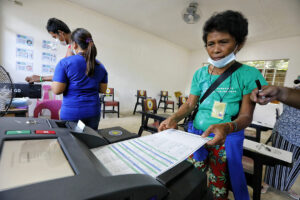Disclose election deal, Comelec told
THE Commission on Elections (Comelec) should release documents connected to the election contract it awarded to a South Korean company for this year’s midterm poll to spur public confidence in the electoral system, a watchdog group said on Monday. In a statement, Democracy Watch Philippines pushed the poll body to disclose all documents regarding the […]

THE Commission on Elections (Comelec) should release documents connected to the election contract it awarded to a South Korean company for this year’s midterm poll to spur public confidence in the electoral system, a watchdog group said on Monday.
In a statement, Democracy Watch Philippines pushed the poll body to disclose all documents regarding the procurement contract of automated election equipment it awarded to Miru Systems Co., Ltd. last year, following the withdrawal of a Filipino counterpart.
“We call on Comelec to proactively disclose key documents, including financial records, ownership agreements, and contract details, to assure the public that election integrity will not be compromised,” the group said.
 “Any attempt to withhold such information will only deepen public mistrust and fuel suspicions about the integrity of the election process,” it added.
“Any attempt to withhold such information will only deepen public mistrust and fuel suspicions about the integrity of the election process,” it added.
Miru Systems Co., Ltd. did not immediately respond to an e-mail seeking comment.
“We already provided everything to the Right to Know, Right Now coalition. We have the records to prove it,” Comelec chairman George Erwin M. Garcia told BusinessWorld, referring to a group that filed a Supreme Court petition seeking to compel the poll body to disclose all contract details.
A joint venture composed of Miru Systems Co. Ltd. and two Filipino companies were awarded the P18-billion contract by Comelec to run the country’s electronic poll system after the previous contractor was disqualified from further facilitating automated elections in the country.
The abrupt withdrawal of one of the South Korean technology company’s partners has raised concerns regarding the financial capabilities and legal compliance of the joint venture to carry out the elections, according to the watchdog group.
“With its withdrawal, there are legitimate questions as to whether the joint venture retains the financial and operational capacity to fulfill its contractual obligations to Comelec,” Democracy Watch Philippines said.
Comelec should also clarify whether the consortium is still compliant with a constitutional provision stating that businesses must be at least 60% Filipino-owned and if there were efforts to abide by the foreign ownership limitations, it added.
“As we approach the 2025 elections, we urge Comelec to demonstrate its commitment to safeguarding democracy by prioritizing transparency, fiscal responsibility, and adherence to legal standards,” the group said.
Filipinos will pick a new set of congressmen, 12 of the 24-member Senate and other local government officials on May 12.
In a separate statement, Bukidnon Rep. Jonathan Keith T. Flores said moving the Bangsamoro Autonomous Region in Muslim Mindanao’s (BARMM) elections to October 2025 would help the government better deploy its security resources in Mindanao to ease election-related violence.
Having an “unsynchronized” election schedule would prevent the police, military and poll body personnel from being stretched too thin, allowing them to better police areas susceptible to election violence, he said.
Elections in the southern Philippines are traditionally marred by violence due to the presence of local political families in the region that are grappling for influence during poll campaigns in an effort to remain in power.
“Keeping the peace and averting violence would be very difficult if the BARMM polls happen in May,” he said.
The Philippine Congress deferred the autonomous region’s first-ever parliamentary elections to Oct. 13 from a year earlier after the Supreme Court ruled to exclude Sulu province from being part of it. — Kenneth Christiane L. Basilio











